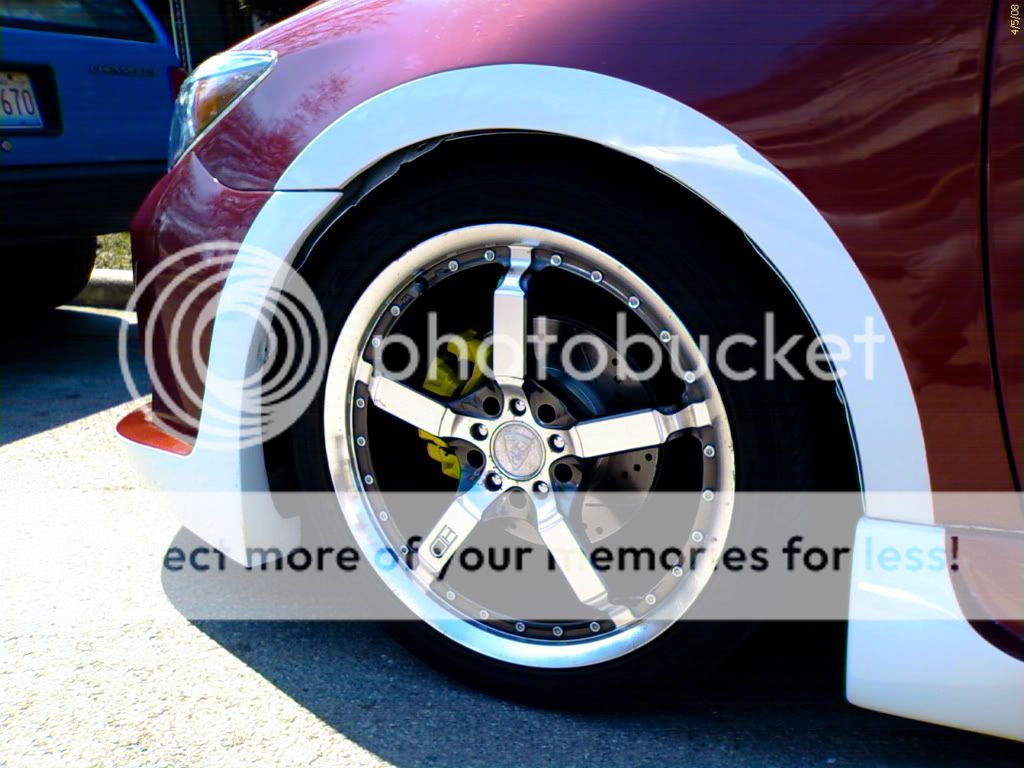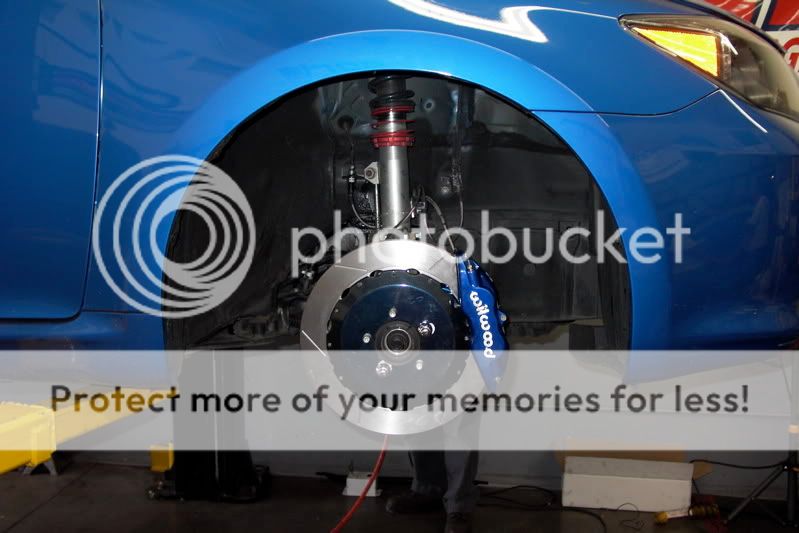Post Pics of Brake Upgrades
#108
I know I'm going to get flamed for this, but the physics of it frustrates me. seems to me that a larger surface area with more clamping force would equal less stopping distance. when i look at road test summaries from road & track, this is what I see
Scion Tc stopping distance from 80 mph to 0 mph: 227 ft
But check out the curb weights of some cars that stop from 80 to zero in LESS than 200 feet:
Bentley Continental GT, 5350 lbs (!!!), 199 ft
Bugatti Veyron, 4470 lbs, 199 ft
Audi R8, 3650 lbs, 196 ft
Ferrari 599 GTB, 4000 lbs, 186 ft
Maserati Quattroporte, 4125 lbs, 200 ft
Mercedes CLK63 AMG, 3800 lbs, 199 ft
Nissan GTR, 3800 lbs, 191 ft (!!!)
Shelby GT500, 3915 lbs, 200 ft
Go on and light me up because these are all supercars. but physics is physics and brakes are brakes; you're using friction via rotational mass to stop an object. all of these cars are sizeably heavier than the Tc, and I want to make the argument that they stop better because they have much better brake systems. what makes a better brake system? I would think a bigger one. I read the article from on stop tech about the rear brakes and I'm not buying that one either. somebody please come up with a scientific explanation for the above. I'd love to hear from the stoptech guy. and if it's all tires, then on my falken rt-615 my brakes should be great, but. . . they're not.
Scion Tc stopping distance from 80 mph to 0 mph: 227 ft
But check out the curb weights of some cars that stop from 80 to zero in LESS than 200 feet:
Bentley Continental GT, 5350 lbs (!!!), 199 ft
Bugatti Veyron, 4470 lbs, 199 ft
Audi R8, 3650 lbs, 196 ft
Ferrari 599 GTB, 4000 lbs, 186 ft
Maserati Quattroporte, 4125 lbs, 200 ft
Mercedes CLK63 AMG, 3800 lbs, 199 ft
Nissan GTR, 3800 lbs, 191 ft (!!!)
Shelby GT500, 3915 lbs, 200 ft
Go on and light me up because these are all supercars. but physics is physics and brakes are brakes; you're using friction via rotational mass to stop an object. all of these cars are sizeably heavier than the Tc, and I want to make the argument that they stop better because they have much better brake systems. what makes a better brake system? I would think a bigger one. I read the article from on stop tech about the rear brakes and I'm not buying that one either. somebody please come up with a scientific explanation for the above. I'd love to hear from the stoptech guy. and if it's all tires, then on my falken rt-615 my brakes should be great, but. . . they're not.
#110
clamping area is simple and clamping force which is simple physics as you would say. the more friction the more stopping correct? so if you have a pad that is double the size it will generate twice the friction also materials of both the pad and the rotor will also help. Lastly its the weight distribution, all those cars you posted have very close to 50/50 weight distribution and use huge brakes made out of a ceramic composite etc...
each one of those cars have 4 piston rears with 13+" rotors and at least the same up front, our car has 11" rotors with 4 piston calipers front and ____ty ___ 2 piston rears but its about materials of both components as well as oil and everything, its hard to just condense it down into "simple physics" when its an engineering problem.
each one of those cars have 4 piston rears with 13+" rotors and at least the same up front, our car has 11" rotors with 4 piston calipers front and ____ty ___ 2 piston rears but its about materials of both components as well as oil and everything, its hard to just condense it down into "simple physics" when its an engineering problem.
#111
actually none of the aforementioned have carbon compound rotors. I'm pretty sure only a few of them even have them available as an option. so nebs agrees with me, if I put 6 piston calipers with the best hawk pads available on the market up front and 4 piston calipers with the same in the rear, bump my rotors to 14" up front and 12" rear, slotted, get my car corner balanced and play with the bias, I should get some major stopping distance decreasage. but there are a lot of people arguing that that's not true; it will only help brake fade on a track, and it might even increase my stopping distance. I can't buy that. . .
thanks nebs, anyone else for/against?
thanks nebs, anyone else for/against?
#116
Nothing special but these are my brake -co. I will be getting willwoods at the end of the summer. I thought these would increase braking power.... Its just for looks. Not bad for 190 though w/ pads.


#119
one main thing you are forgetting about.... ABS!
The problem with BBK's on tC's is the ABS system. Since the tC's brake system wasn't designed for a BBK, you can active the ABS to go into effect even when you don't want it to, which can increase stopping distance (I know this because I have locked the brakes a few times with my rotora BBK). Now... if you have better tires, this can combat that a little. As neb sai, out weight distribution isnt even close to 50/50, and our rear calipers / rotors are a joke. When I installed my BBK over a year ago, that was the first time I got hands on the the rear brakes, and I was seriously gonna cap the line off, and remove the rear brakes, but i obviously didn't cause there would be no advantage to that.
Recap:
Size of Caliper and Amount of Pistons
Size of rotor, and if tis slotted/drilled/vented
Composite of Pad
Tires
Weight of Wheels
Overall Weight Distribution
ABS
Temperature of brake pads when tested for distance
All of the above are things that can very with brake distance
The problem with BBK's on tC's is the ABS system. Since the tC's brake system wasn't designed for a BBK, you can active the ABS to go into effect even when you don't want it to, which can increase stopping distance (I know this because I have locked the brakes a few times with my rotora BBK). Now... if you have better tires, this can combat that a little. As neb sai, out weight distribution isnt even close to 50/50, and our rear calipers / rotors are a joke. When I installed my BBK over a year ago, that was the first time I got hands on the the rear brakes, and I was seriously gonna cap the line off, and remove the rear brakes, but i obviously didn't cause there would be no advantage to that.
Recap:
Size of Caliper and Amount of Pistons
Size of rotor, and if tis slotted/drilled/vented
Composite of Pad
Tires
Weight of Wheels
Overall Weight Distribution
ABS
Temperature of brake pads when tested for distance
All of the above are things that can very with brake distance















